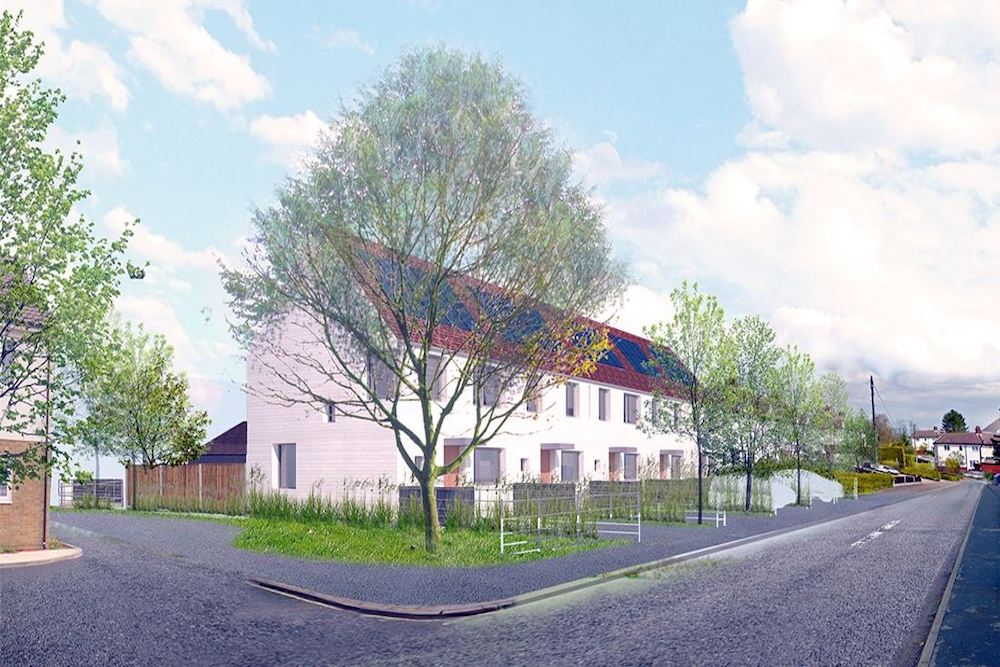
by Kim Pidgeon | Sep 10, 2023 | News
The housing associations join forces to become 81,000-home HA
The proposed merger between Sovereign Housing Association and Network Homes has been approved by the boards of both social housing providers.
The two housing associations have formally agreed to form Sovereign Network Group (SNG), with the merger due to take place on 1 October 2023.
Network Homes owns and manages over 21,000 homes predominantly in London and Hertfordshire, while Sovereign have almost 60,000 homes covering Berkshire, Hampshire, Oxfordshire, Gloucestershire, Dorset, Devon, Wiltshire, the West of England and the Isle of Wight.
Together, as SNG, they will be one of the largest housing associations in the country serving over 210,000 residents across London and the south of England.
Sovereign chief executive, Mark Washer, will become CEO of SNG, and Network Homes chief executive, Helen Evans, will become SNG’s Deputy CEO.
Washer commented: “Bringing these two great organisations together will enable us to invest in creating more homes, and better homes for our current and future customers. Combined, we will be a leader in delivering sustainable and affordable housing, including for social rent, as well as investment in communities.
“We are already seeing the potential for our complementary skills and experience to help us deliver better for each of our customers, and the future is hugely exciting.”
The proposed merger, which was first announced in March 2023, now has board-approval from both HAs following due diligence, tenant consultation and engagement activities with colleagues.
Helen Evans said: “I’m pleased we now have the green light to pursue this exciting new chapter for both organisations as we join together as one organisation.
“As deputy chief executive, I will be overseeing the transition and significant work is now underway to ensure we will have the right structures, systems, and processes to deliver for customers from 1 October onwards. I’m looking forward to working with Mark, our new Executive Board and colleagues in ensuring the new organisation is a success.”
SNG plans to invest around £8.5 billion in existing and new homes over the next ten years, with an annual development programme of up to 2,500 homes a year alongside a retrofit strategy.
The new organisation will establish a new community foundation which will invest £100m over ten years to directly support residents and communities. It will also adopt Sovereign’s Homes and Place sustainability and wellbeing standard that was co-created with customers.
Network Homes (renamed Sovereign Network Homes) will initially join as a subsidiary of SNG before a transfer of engagements which is expected to take place in April 2025.

by Kim Pidgeon | Aug 25, 2023 | News
New rules form part of Bill to protect residents and raise standards in the sector
The Local Government Association (LGA) is calling on the Government to help shoulder the cost of implementing the new standards under the Social Housing (Regulation) Act.
Included in the Bill is the requirement that senior housing management staff must complete qualifications up to a certain level.
Research undertaken by the LGA has found the changes are likely to cost councils £17.9 million in the first two years and £3.7 million a year on an ongoing basis.
The LGA, which represents councils, says these additional costs need to be fully funded by government to prevent costs falling on over-stretched Housing Revenue Accounts (HRAs).
It is calling for the implementation to be properly managed, for the Government to work with the LGA and qualification bodies on a strategy and timetable, and for local areas to be able to make their own assessments of roles.
Along with costings, the LGA’s new research also found 66 per cent of senior housing managers at respondent councils were not yet sufficiently qualified to meet the new requirements, and 54 per cent of senior housing executives likewise require further qualifications.
Furthermore 62 per cent reported they would not feasibly be able to ensure total compliance with the required level of qualifications within a two-year period, given their current resources.
Cllr Linda Taylor, LGA housing spokesperson, said: “Councils are fully committed to improving the quality of social housing, supporting housing staff and ensuring they receive appropriate training and can gain qualifications to help them in their roles.
“With costs to councils likely to be almost £18 million just for the first two years, it is essential that these new requirements are fully funded.
“Councils’ Housing Revenue Accounts are already facing unsustainable financial pressures, and this would be an additional burden which risks impacting on councils’ ability to fulfil their roles effectively as housing authorities.
“In addition, as our research shows, councils need more time to plan and implement these new requirements that are being imposed on them. This is why it is vital government works with us, and that these changes are carefully and properly managed, while being mindful of the significant workforce challenges housing teams are facing right now including recruitment and retention concerns.”
The Act will also include a range of other measures, such as strengthening the role of the Regulator of Social Housing to increase the rights of tenants and enable tenants to better hold their landlord to account on consumer issues, as well as the Ombudsman in dealing with complaints.

by Kim Pidgeon | Aug 18, 2023 | News
The build’s performance data will be shared with the Government ahead of its new Future Homes Standard coming into force in 2025
Clarion Housing Group will embark on a landmark scheme to create seven highly efficient and affordable new homes in Cottered, East Herfordshire.
The project will see four vacant bungalows in the village redeveloped into seven terraced houses and bungalows by the social landlord, architect Pollard Thomas Edwards (PTE) and contractor LIFE Build.
The two property types will feature different technologies, air tightness and energy performance.
The two housebuilding approaches are in line with the upcoming 2025 Future Homes Standard (FHS). Using the pilot scheme, Clarion will explore the process and costs to achieve FHS performance and will report its findings back to Government.
New residents of the highly energy efficient development – which will all be for affordable rent – will have warmer homes and cheaper energy bills than most older-built properties.
The five houses are being built using a ‘fabric-led’ approach and will feature a mechanical ventilation heat recovery (MVHR) system and improved thermal performance. They will feature Mixergy smart hot water tanks, and a mix of electric radiators or infrared panels for heating.
The two bungalows will adopt a ‘technology-led’ approach using a mechanical extract ventilation (MEV) system to continuously extract air from the properties. Wet radiator systems will be powered by an air-source heat pump, which will provide hot water via a linked cylinder.
All seven homes, which are due to be completed in February 2024, will also include photovoltaic solar panels.
Once residents have moved into the finished homes, Clarion and PTE will run post-occupancy testing for one year to monitor the comfort and performance of the two property types – including temperature and humidity levels, ventilation and energy consumption.
The testing will also focus heavily on the resident experience, assessing if residents are maximising the performance of the homes and whether the technology is suited to their needs.
Richard Cook, group development director at Clarion Housing Group will report the post-occupancy performance data at Cottered to Government, which will publish its new Future Homes Standard in 2024.
The new building standard is set to come into force in 2025, when all new housing is required to be ‘zero carbon’ ready.

by Kim Pidgeon | Jul 27, 2023 | News
The Government announces a new era of regeneration, inner-city densification and housing delivery across England…
The Prime Minister Rishi Sunak and Secretary of State for Levelling Up, Housing and Communities Michael Gove have set out further plans for tackling the housing crisis.
Regeneration
Following the Levelling Up White Paper commitment to regenerate 20 places, three areas were highlighted as next in line for targeted action: Cambridge, inner-city London and central Leeds.
The proposals for Cambridge are designed to see the city become ‘Europe’s science capital’. Plans will address the issues constraining that title, including expensive property markets, limited lab space and high commercial property prices.
Plans for Cambridge envision new sustainable neighbourhoods, a quarter for cutting-edge laboratories and commercial developments, and life science facilities.
The government will deliver as much of the infrastructure and affordable housing as possible using land value capture – with the local area benefiting from the significant increase in land values that can occur when agricultural land is permitted for residential and commercial development.
A Cambridge Delivery Group will drive the project, leading on identifying the housing, infrastructure, services and green space required – along with delivery. Immediate action will address barriers to plans such as water scarcity across the city.
In addition to Cambridge, the government also announced a ‘Docklands 2.0’ vision in east London for up to 65,000 homes across multiple sites of significant scale including at Thamesmead, Beckton and Silvertown.
The plan states London will also see the benefits of the government’s decision to allow the Affordable Homes Programme to be directed towards regeneration for the first time – with up to £1 billion available in London alone. £1 million has also been made available to push forward work with the Mayor to consider how the government drive housing delivery in London, including looking at innovative new ways that industrial land can be released for housing.
For Leeds, the government will accelerate work in the centre by identifying the remaining barriers to delivery for key housing growth sites within the city, including the South Bank and Innovation Arc.
Also outlined were plans to continue working closely with local partners in Barrow-in-Furness to help make it a new powerhouse of the North.
That includes £800 million investment from the £1.5 billion Brownfield, Infrastructure and Land fund to unlock up to 56,000 new homes across England, and funding Homes England with £550 million. As previously announced, £250 million is being provided to Greater Manchester and West Midlands Combined Authorities.
Densification
Alongside targeting areas, the government wants to unleash building on underused sites in high-demand regions via densification. They state that the country’s inner cities have much lower population densities than comparable Western countries, impacting our productivity.
The densification plan therefore includes: a consultation on new Permitted Development Rights (PDR). New and amended PDR would make it easier to convert larger department stores, space above shops and office space. The plan also supports farm diversification and development.
Taking steps to unblock the bottlenecks in the planning system with a £24 million Planning Skills Delivery Fund to clear backlogs, a new “super-squad” team of leading planners to unblock major housing developments, and increasing the amount developers pay in planning fees to ensure all planning departments are better resourced.
Building safely
The government says it will not be complacent in its approach to safety – recognising that, “as work progresses to densify our towns and cities, people must be given unimpeachable confidence that new homes are safe and decent to live in.”
The government confirmed the intention to mandate second staircases in new residential buildings above 18m. It states this new regulation cannot jeopardise the supply of homes by disrupting schemes that have been planned for years, saying the DLUHC will work rapidly with industry and regulators over the summer to design transitional arrangements with the aim of securing the viability of projects which are already underway.
They will also open the Cladding Safety Scheme to all eligible buildings, ensuring that no leaseholder will be out of pocket to fix dangerous cladding in medium or high-rise buildings.

by Kim Pidgeon | Jul 10, 2023 | News
The new developments will use brownfield sites across the North West
Housing provider Great Places has entered a partnership with housebuilder Stonebond.
The agreement will see the two partners initially deliver over 600 affordable homes. The agreement, however, provides a long-term strategic framework giving the partnership the potential to deliver further homes in the future.
The new homes will be delivered on multiple brownfield sites across Greater Manchester and Cheshire.
Great Places will provide the homes for affordable rent, social rent and shared ownership.
Great Places Housing Group has 24,000 homes across the North West and Yorkshire. The group encompasses: Great Places Housing Association, Plumlife – an affordable home ownership company with Help to Buy and Shared Ownership schemes and Cube – providing new homes for market sale and private rent.
The framework is a first for Stonebond’s recently-opened Manchester operation. The branch is set to deliver up to 200 homes per annum by 2025 – a significant contribution to the group’s target of 1,000 homes per annum by the same year.
Commenting on the agreement, Nick Gornall, Great Places’ director of development, said: “Partnership working is at the heart of Great Places and we’re excited to be working alongside Stonebond to deliver much needed affordable homes with a focus on brownfield sites within Greater Manchester and Cheshire.
“The values of our businesses align and early collaboration has seen the teams create a shared vision of how our developments will look and feel which in turn has led to us securing a strong pipeline of sites.
“600 affordable homes under this partnership is just the start as we continue to deliver our Homes England Strategic Partnership programme.”
Andrew Cornelius, group chief executive of Stonebond, added: “This partnership is a major milestone for not just our Manchester operation, but for Stonebond’s overall growth plans.
“Our professional relationship with Great Places has been built over 15 years thanks to our founders Richard and Graham Cherry. Our two businesses share the same ethos and approach to affordable housing delivery, as well as build quality, and together we can make a major and long-term contribution to the North West’s affordable housing provision.”




